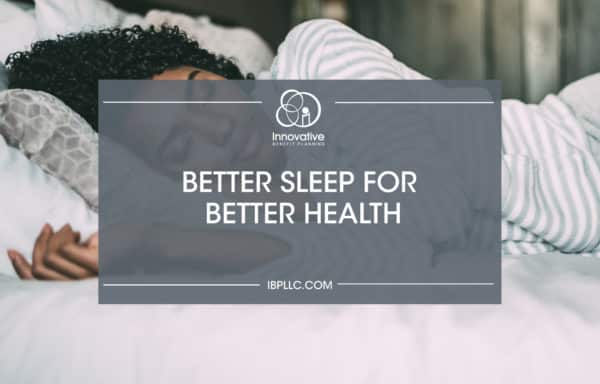Better Sleep for Better Health

Better Sleep for Better Health
As we approach the holiday season, it is important to remember to take some time to care for yourself. The holidays can be extremely busy, stressful, and even draining at times. Don’t forget to make yourself a priority. Self-care is about taking time for yourself, and one way to ensure you are dedicating some time to yourself is to work on improving your sleep and sleep habits.
Research shows that as many as 60% of Americans suffer from poor quality sleep. It is recommended that adults get 7-9 hours of sleep per night because sleep plays a vital role in promoting physical health, longevity, and emotional well-being. Take some time to read these tips provided by Innovative Benefit Planning’s Nurse Advocate in order to improve your sleep during these stressful times.
- Stick to a sleep schedule. Set aside a minimum of 7 hours of sleep per night. Try to wake up and go to bed at the same time each day to reinforce your sleep-wake cycle.
- Pay attention to what you eat and drink. Avoid heavy meals before bedtime. Try to avoid caffeine (coffee, tea, sodas, and chocolate) after mid-afternoon, as they can also disrupt your sleep. Excessive alcohol before bedtime can interfere with both the quantity and quality of sleep.
- Create a restful environment. Make your bedroom cool, dark and quiet. Darkness gives your body the cue to release its natural sleep hormone, melatonin. Consider a warm bath or a cup of chamomile tea before bedtime.
- Unplug from electronics. Try this a few hours before bed. Avoid falling asleep while watching the
television or scrolling through your phone. - Increase your daily physical activity. Research shows that daily exercise helps you fall asleep quicker and increases the quality of your sleep. Avoid strenuous exercise 2-3 hours before bedtime
so that your body has time to unwind. - Manage your worries. Try to resolve worries or concerns before bedtime either by speaking to
a loved one about it or jotting it down in a journal. Meditation is often recommended to help with
anxiety and sleep. - Get outside every day. It’s important to find joy in your natural surroundings. Nature helps promote our circadian rhythms.
- Try not to force sleep. If you cannot fall asleep within 30 minutes, then get out of bed and try relaxation techniques until you are sleepy again.
For a downloadable PDF to easily provide your employees, click here.
Categories
Archive







